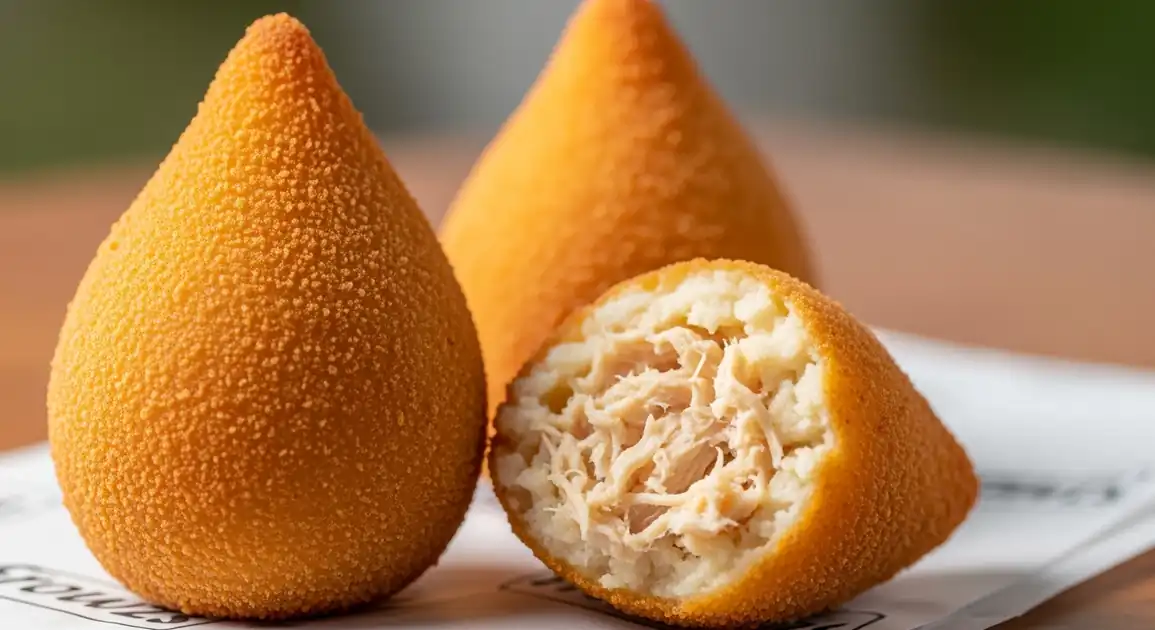Coxinha (Brazilian Chicken Croquette)
Coxinha

Description
São Paulo, as a culinary powerhouse and likely birthplace of the modern coxinha, offers an incredible variety and quality of this beloved snack. From traditional padarias in Italian neighborhoods like Bixiga to bustling lanchonetes downtown and gourmet versions in trendy cafes, São Paulo is a coxinha paradise.
Dietary Information
Serving information
Serving style
Served hot on a napkin or small plate. Eaten by hand. Hot sauce readily available. Coffee or juice are common pairings.
Quick facts
Padarias open very early (e.g., 6 AM) until late (e.g., 10 PM). Lanchonetes vary but cover main eating times. Bars typically open late afternoon/evening.
Safety Tips
What to Look For
-
Coxinha fried fresh ('frito na hora') or kept very hot
Ensures the snack is cooked thoroughly and minimizes risk from being held at unsafe temperatures. Fresh frying yields the best crispy texture.
-
Golden-brown, intact crust
Indicates proper frying temperature and technique. Avoid coxinhas that are pale (undercooked) or cracked/leaking.
-
Clean vendor environment (lanchonete, padaria, cart)
General cleanliness of the counter, display case, and vendor handling practices are good indicators of overall hygiene.
-
Busy establishment with high turnover
Suggests ingredients and batches are likely to be fresher.
-
Hot, relatively clean frying oil
Avoid places using extremely dark, old, or smoking oil, which impacts flavor and safety.
What to avoid
-
Coxinhas sitting under a heat lamp for a long time
Quality degrades rapidly (becomes soggy or dry), and holding food at lukewarm temperatures increases food safety risks.
-
Pale, undercooked-looking coxinhas
May not be cooked through properly.
-
Coxinhas that are broken, leaking filling, or look collapsed
Could indicate poor preparation or that they are old.
-
Excessively greasy coxinhas
Suggests frying oil might not have been hot enough.
-
Vendors with visibly poor hygiene practices
Increases the risk of contamination.
Price information
Price range
Budget tips
- Stick to traditional padarias and lanchonetes for the best value.
- Gourmet coxinhas in cafes or upscale bars will cost more.
- Look for 'promoção' (special offer) signs.
- Avoid buying right next to major tourist landmarks if possible.
Value indicators
- Crispy exterior, not greasy.
- Creamy, well-seasoned chicken filling (Catupiry is a plus!).
- Good balance between dough thickness and filling amount.
- Served hot and appears freshly made.
Where to Find This Dish
Traditional Padarias (e.g., Bixiga, Mooca)
Neighborhood bakeries in areas with strong immigrant heritage often have excellent, classic coxinhas.
Rua Augusta (parts), Neighborhood churches/squares
Morning, Afternoon
Centro (Downtown)
Countless lanchonetes and padarias catering to office workers and shoppers.
Praça da Sé, Rua 25 de Março vicinity, República Square
Lunchtime, Mid-afternoon
Vila Madalena / Pinheiros
Trendy areas with bars and cafes offering both traditional and gourmet coxinhas.
Rua Aspicuelta, Largo da Batata
Afternoon, Evening (bars)
Mercado Municipal (Mercadão)
While famous for Mortadella sandwiches, the market has stalls selling various salgados, including coxinhas.
Main market hall
Lunchtime, Late Morning
Vendor Tips
- Paulistanos are discerning; places with queues are often worth the wait.
- Don't underestimate the quality in simple, traditional padarias.
- Try both the classic 'frango' and 'com Catupiry' versions.
- Be aware that some gourmet versions might deviate significantly from the classic taste/texture.
How to Order
Regional Variations
-
Coxa Creme
(Coxa Creme)
A variation where a real chicken drumette bone is inserted into the coxinha before frying, enhancing the 'chicken thigh' resemblance. Less common now.
-
Gourmet Coxinhas
(Coxinhas Gourmet)
São Paulo's food scene includes upscale versions with fillings like duck, brie cheese, or using different doughs (e.g., mandioquinha - arracacha).
-
Coxinha Vegana Específica
(Coxinha Vegana Específica)
São Paulo has a growing number of vegan eateries offering specialized vegan coxinhas with fillings like jackfruit ('jaca') or seasoned soy.
Cultural context
History
While various origin stories exist, including legends involving Brazilian royalty requesting a chicken thigh when none were available, the modern coxinha likely developed in São Paulo state during the period of industrialization in the late 19th or early 20th century. It became a way to utilize unsold chicken parts, transforming them into a delicious and affordable snack. Its popularity spread rapidly, making it one of Brazil's most iconic and consumed savory pastries.
Local significance
Coxinha is an inseparable part of São Paulo's daily life and gastronomic identity. It fuels the city's fast pace and offers a moment of affordable indulgence.
Eating customs
- Often eaten quickly while standing at the counter ('balcão').
- Adding hot sauce is almost instinctive for many.
- Ordering multiple types of 'salgados' (like kibe, empada) alongside coxinha is common.